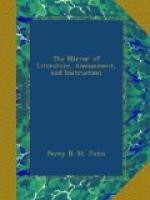In the latter years of his life, Parr had been subject to erysipelas; once he had suffered by a carbuncle, and once by a mortification in the hand. Owing to this tendency to diseased action in the skin, he was easily affected by cold, and on Sunday, the 16th of January, 1825, having, in addition to the usual duties of the day, buried a corpse, he was, on the following night, seized with a long-continued rigor, attended by fever and delirium, and never effectually rallied again. There is a note, however, dated November 2, 1824, addressed by him to Archdeacon Butler, which proves that he felt his end approaching, even before this crisis.
“Dear and Learned Namesake,—This letter is important, and strictly confidential. I have given J. Lynes minute and plenary directions for my funeral. I desire you, if you can, to preach a short, unadorned funeral sermon. Rann Kennedy is to read the lesson and grave service, though I could wish you to read the grave service also. Say little of me, but you are sure to say it well.”
Dr. Butler complied with his request, and amply made good the opinion here expressed. He spoke of him like a warm and stedfast friend, but not like that worst of enemies, an indiscreet one; he did not challenge a scrutiny by the extravagance of his praise, nor break, by his precious balms, the head he was most anxious to honour. Dr. Parr’s death was tedious, and his faculties, except at intervals, disturbed. He took an opportunity, however, afforded him by one of these intervals, of summoning about his bed his wife, grand-children, and servants; confessed to them his weaknesses and errors, asked their forgiveness for any pain he might have caused them by petulance and haste, and professed “his trust in God, through Christ, for the pardon of his sins.” One expression, which Dr. Johnstone reports him to have used on this occasion, is extraordinary—that “from the beginning of his life he was not conscious of having fallen into a crime.” Far be it from us to scrutinize the words of a delirious death-bed—These must have been uttered (if, indeed, they are accurately given) either in some peculiar and very limited sense, or else at a moment when a man is no longer accountable to God for what he utters. The latter was, probably, the case: for in the same breath in which he declares “his life, even his early life, to have been pure,” he sues for pardon at the hands of his Maker, and acknowledges a Redeemer, as the instrument through which he is to obtain it.
That quickness of feeling and disposition to abandon himself to its guidance, which made Parr an inconsistent man, made him also a benevolent one. Benevolence he loved as a subject for his contemplation, and the practical extension of it as a rule for his conduct. He could scarcely bear to regard the Deity under any other aspect. He would have children taught, in the first instance, to regard him under that aspect alone; simply as a being who displayed infinite goodness




